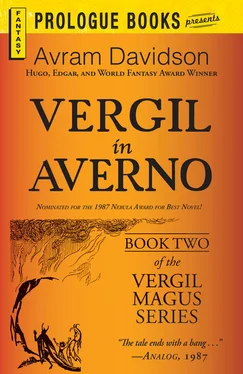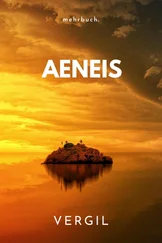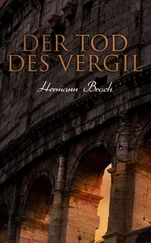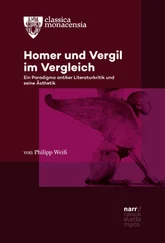Avram Davidson - Vergil in Averno
Здесь есть возможность читать онлайн «Avram Davidson - Vergil in Averno» весь текст электронной книги совершенно бесплатно (целиком полную версию без сокращений). В некоторых случаях можно слушать аудио, скачать через торрент в формате fb2 и присутствует краткое содержание. Жанр: Фэнтези, на английском языке. Описание произведения, (предисловие) а так же отзывы посетителей доступны на портале библиотеки ЛибКат.
- Название:Vergil in Averno
- Автор:
- Жанр:
- Год:неизвестен
- ISBN:нет данных
- Рейтинг книги:3 / 5. Голосов: 1
-
Избранное:Добавить в избранное
- Отзывы:
-
Ваша оценка:
- 60
- 1
- 2
- 3
- 4
- 5
Vergil in Averno: краткое содержание, описание и аннотация
Предлагаем к чтению аннотацию, описание, краткое содержание или предисловие (зависит от того, что написал сам автор книги «Vergil in Averno»). Если вы не нашли необходимую информацию о книге — напишите в комментариях, мы постараемся отыскать её.
Vergil in Averno — читать онлайн бесплатно полную книгу (весь текст) целиком
Ниже представлен текст книги, разбитый по страницам. Система сохранения места последней прочитанной страницы, позволяет с удобством читать онлайн бесплатно книгу «Vergil in Averno», без необходимости каждый раз заново искать на чём Вы остановились. Поставьте закладку, и сможете в любой момент перейти на страницу, на которой закончили чтение.
Интервал:
Закладка:
Vergil expressed his thanks, neither magnate nor man made a reply, and he was left with nothing to do but follow the same slave who had led him in. . still dilatory, still sullen, and still with the cast in one eye. The door in the gate closed swiftly behind the parting guest. For all Vergil’s pains, what were his gains? The tablets. “And I am lucky the fellow did not snatch them back,” he said ruefully. He had felt his cloak catch in the gate, so swiftly closed it shut; now he turned to tug it loose, hoping it was neither so fast-snared that he must needs either knock once more to be released or else cut it loose and spoil the cloak and perhaps also make him a figure of mockery to the mob; but it had in fact been caught so slightly that the mere movement as he turned had got it free.
The tablets, worth no small sum even had the wax been smooth and blank, the tablets had yet some message graved upon them doubtless more worth than the precious covers. Vergil had indeed begun to extract his own set (of sturdy, worn-smoothed boxwood bearing no other design than monogram or rune-sign formed by the V and M woven each through the other) and stylus to copy the notations, but the magnate’s secretary, with a gesture of hand and an expression of mouth had indicated he was to keep the ones handed him, a gesture so curt and an expression so scornful as to make the recipient of the gift wish to throw it back in the giver’s face.
And now he stood with it in hand, and with nought else in hand, outside the giver’s gate, and in the street again.
“Thankful to see you safe, sir,” said Iohan, and indeed he did look thankful; and even the mare nuzzled him briefly, as though thankful herself.
A sort of heavier twilight had settled over everything. Westward, a delayed and brighter light, dull-red glowering through dull gray haze, showed what to the rest of the world was still the undying and unconquerable sun. Sulfurous smell, mixed with the stink of rotting indigo and the thick reek of tanyards and the fetor of putrescent fat and flesh clinging to the blue-green undersides of sheep fells at the wool-pulleries, all mingled in the haze and fume; this, then, was the “sweet breeze of Averno,” a phrase muttered elsewhere when a public urinal or cloaca gave evidence of badly needing cleaning. But the thump-thud of hammers and mallets beating all about did not slow down in the slightest, nor did traffic slacken in the street; only the torch-lighter passed by, bundle of tarry sticks under one arm and lighted link in one hand. He set in a stick wherever a holder hung on a wall, set it afire, and passed on — all this in a half-trot. As he showed no sign of swerving, the two newcomers drew back. “He might have run us down, else,” said Iohan, half in anger, half in wonder.
“Yes. . they all might. . may…. We must find an inn.”
But something else happened to intervene before they found one.
Somewhat ( some what?) belatedly, the City’s Official Orator and a very youthful assistant — like a great-nephew learning the trade (if not, by present tokens, learning it well) — appeared, to offer the only semblance of a civic welcome which, Vergil felt, he was likely to get: the Orator, in a fusty purple robe, local weave and local dye for sure, doing his best to read an official welcome and amend it ad-lib. . as it had never been intended for sage or mage. . and the lad at his side shifting from hand to hand, whenever he desired to scratch his pubescent crotch, the hand-brazier indeed full (well, partly full) of glowing charcoal on which it was intended someone should from time to time strew incense. But no one performed the role of “someone,” the lad gaped when he was not scratching, the Orator waved his free hand as he skipped not too smoothly over words intended to be laudatory of Vergil’s (nonexistent) military conquests and waved his free hand (not always the same hand, as sometimes he endeavored to pound the stripling on the pate, perhaps to discourage open and notorious crotch-scratching) to indicate he would delineate more particularly the details of “the most learned and honored visitor,” his learning and his honor, if only he had more than a hasty toehold on the matter. Suddenly Vergil to his vast, and then his less than vast, surprise, heard the words “ Master in Philosophy, Master in Arts Magical, Adept of the First Three Grades at Grammarie, Passed Master on the Astrolabe; Astrologue, West of Corinth and Astrologue, East of Corinth ” — at which time he perceived, firstly, that someone had slipped, not a spoon of olibanum onto the charcoal, but a piece of papyrus into the Orator’s hand, which the Orator did not entirely successfully succeed in concealing behind the tattered and greasy official scroll of welcome; and, secondly, exactly who it was who had done so: a man with a light sparse beard and with rather prominent front teeth.
Though this time he wore no striped robe, but tunic and hose of solid hue.
— And all this while and, he, Vergil, now stopped his thoughts full stop and harked him back a ways, and yet a ways, and yet a ways beyond that, and all this while and he could not say for how long a while, save that it was and had been long. He now bethought him that he had heard at all times, now near, now far, not alone the incessant poundings of the forge-hammers and the fulling-mallets; he had heard in addition the endless cries of this as of all cities; but gradually now and at last swiftly it seemed to him that all the while he had heard also music, and not the formal strains of some solemn hymn processional nor the like of shrine or temple — gay, brash, Dionysic, now dim, now clear; he had declined to think on it.
Now, for one long moment (he could not say how long a moment), he had thought on nothing else.
His mind, stopped short, like the passage of a dog on a chain, was caught off-balance; soon enough it recovered. Where was the oddly knowing fellow who —? He was nowhere to be seen, was where? What was to be seen were the Civic Orator and assistant-boy, the small crowd that had collected, and on every face a meaning that Vergil required no divination to grasp. The small crowd, sensing it was time, set up a rusty growl of “Boons! Boons! Boons!” such as he had heard before, but now and here they were accompanied by no pretenses, no mention of Lord , “great,” or otherwise: nothing. A demand it was, no more. So Vergil slipped a piece of silver swiftly into one of the Orator’s hands (who, doubtless desiring to have both hands free, had already slipped his scroll into the presently free hand of his boy, who was now unable to scratch at all), and into the other a handful of birdies. Orator, with a few feints indicating in which direction he intended the distribution to be thrown, the crowd gathered thither — the Orator threw and, with a nod and a word of thanks, got him thence at no slow crawl. The crowd uglied each other as they sprawled and grappled for the small coins, and the few who muttered anything to Vergil muttered nothing kind. Had he given more, more they had demanded; had he given much, they had rabbled him for all.
He mounted the mare. The sight of him on horseback seemed to end the matter for the crowd, which at once ceased to be a crowd at all. “And I had to kick one away,” said Iohan, “for that he’d growed some extra little hands and was groping by the saddlebags, and a other I believe Prima woulda trod upon, but fall away so fast he did.”
Vergil nodded. He had been about to say something, some while back. No. He had said it. What was it? He knew only when he heard himself saying it again.
“We must find an inn.”
And, whilst the boy was in the stable attending to the mare, there in the taproom, someone else was found. “Ah,” said Vergil softly. “So here you are.”
Читать дальшеИнтервал:
Закладка:
Похожие книги на «Vergil in Averno»
Представляем Вашему вниманию похожие книги на «Vergil in Averno» списком для выбора. Мы отобрали схожую по названию и смыслу литературу в надежде предоставить читателям больше вариантов отыскать новые, интересные, ещё непрочитанные произведения.
Обсуждение, отзывы о книге «Vergil in Averno» и просто собственные мнения читателей. Оставьте ваши комментарии, напишите, что Вы думаете о произведении, его смысле или главных героях. Укажите что конкретно понравилось, а что нет, и почему Вы так считаете.












